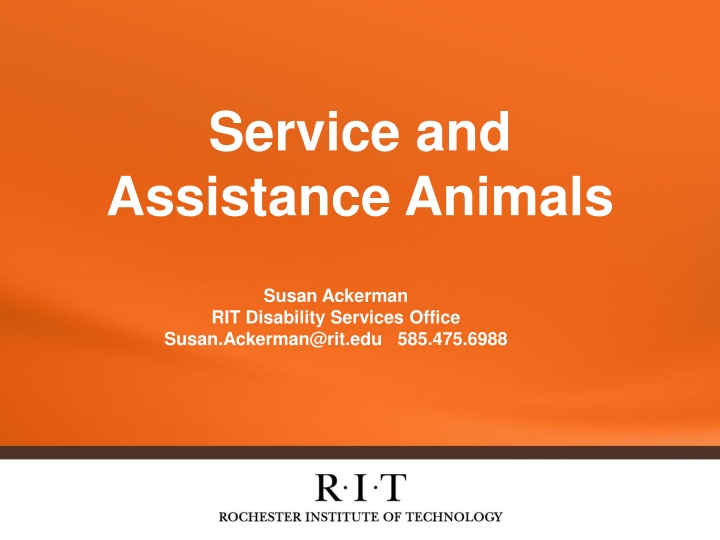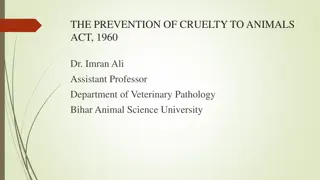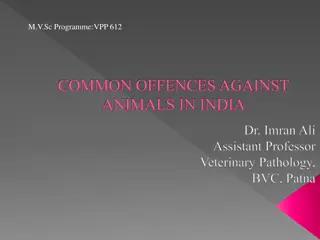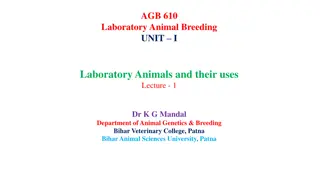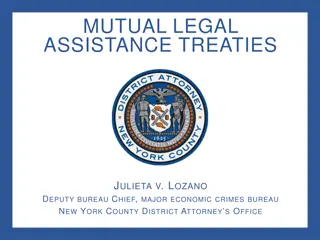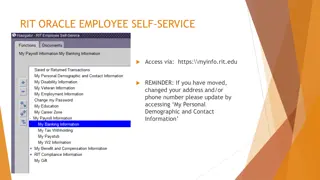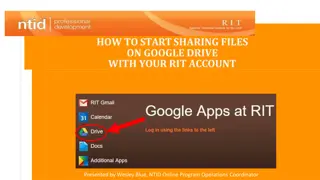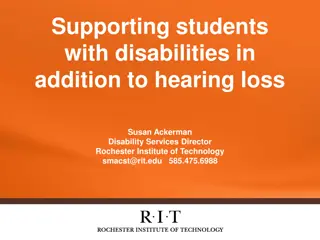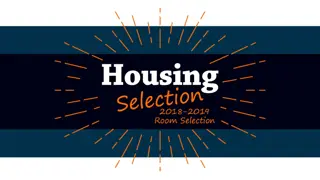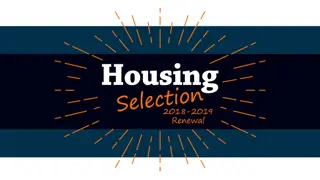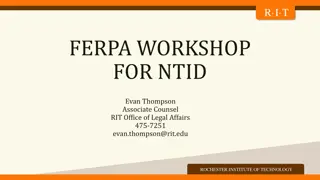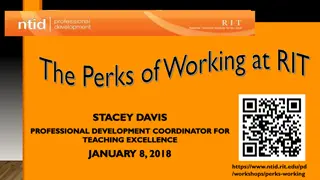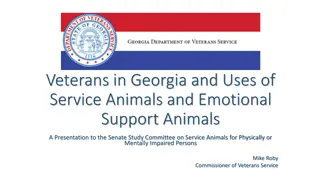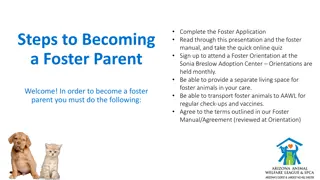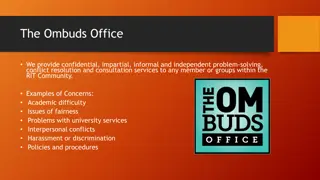Service and Assistance Animals Guidelines at RIT
Service and Assistance Animals Guidelines at RIT provide information on the definition of service and assistance animals, request procedures, expectations of animal and owner, and how to address concerns. The policy distinguishes between service animals trained to perform tasks for individuals with disabilities and assistance animals that provide support or alleviate symptoms. RIT outlines the process for requesting accommodations for service and assistance animals, emphasizing the need for a direct relationship between the animal's assistance and the individual's disability.
Download Presentation

Please find below an Image/Link to download the presentation.
The content on the website is provided AS IS for your information and personal use only. It may not be sold, licensed, or shared on other websites without obtaining consent from the author.If you encounter any issues during the download, it is possible that the publisher has removed the file from their server.
You are allowed to download the files provided on this website for personal or commercial use, subject to the condition that they are used lawfully. All files are the property of their respective owners.
The content on the website is provided AS IS for your information and personal use only. It may not be sold, licensed, or shared on other websites without obtaining consent from the author.
E N D
Presentation Transcript
Service and Assistance Animals Susan Ackerman RIT Disability Services Office Susan.Ackerman@rit.edu 585.475.6988
Agenda for 12:15 12:45 RIT Policy C13.0 Definitions Request procedure What happens next Expectations of animal and owner How to get assistance if there is a concern
RIT Policy C13.0 http://www.rit.edu/academicaffairs/policiesmanual/c130
Service animal DOG trained to work or perform tasks for the benefit of an individual with a disability. The work or tasks performed by a service animal must be directly related to the individual s disability. Currently ~6; mainly hearing dogs Also seeing eye dogs; psychiatric service dogs; seizure dogs
Assistance Animal Any animal that is not necessarily trained to perform specific tasks but provides assistance or benefits to an individual with a disability or otherwise alleviates one or more symptoms or effects of a person s disability. Assistance Animals are commonly referred to as comfort and/or emotional support animals and are restricted to the Owner s Residence. Currently ~60 animals: dogs, cats, ferrets, rabbits, hamsters, guinea pigs, mice, snakes, birds
Request process - Service animal: RIT may inquire if the Service Animal is required because of an ADA Disability and how the Service Animal assists the individual, including what work or tasks the dog has been individually trained to perform. The work or task that the Service Animal performs must be directly related to the individual s ADA Disability.
Request Process - Assistance Animal RIT may inquire if the Assistance Animal is required because of a Disability and how the Assistance Animal assists the individual, including what work, tasks, services, or assistance the Assistance Animal performs, or if the Assistance Animal provides emotional support that alleviates one or more of the identified symptoms or effects of the individual s Disability.
Request process - Assistance Animal cont RIT may require the individual making the request for Assistance Animals to provide documentation on the letterhead of a Qualified Health Care Provider which establishes that individual s Disability and the necessity for an Assistance Animal as a reasonable accommodation.
Differences in questions asked of student Assistance animal Service animal Do you have a disability? Do you need an animal in order to live in RIT residence? Provide documentation: Diagnosis How functioning is affected Why animal is needed Do you have a disability? What tasks has your animal been trained to perform?
RIT Requirements Rabies vaccination: dogs, cats, ferrets Animal Agreement form Student owner/handler agrees to follow rules Animal must be under control of owner Owner is responsible for clean-up Designated building access Process for possible removal Emergency contact person Roommate acknowledgment form Roommates are OK living with an animal
RIT Requirements cont Please note that RIT does NOT require that a service or assistance animal is certified . Training of service dogs can be done by agency, trainer or owner.
If a service animal comes to campus May live in owner s RIT residence May enter other campus buildings, including classrooms Does not need to wear identifier such as jacket or badge Must be under control of owner
If assistance animal is approved to come to campus May live in owner s RIT residence May NOT enter other residences, buildings or go to classes Does not wear identifier jacket or badge Must be under control of owner
If you have a concern: Inquire with DSO are we aware of the animal and is it a service or assistance animal? Contact RIT Public Safety
Thank you for your time and interest! Please contact me for further discussion or information Susan Ackerman 475-6988 susan.ackerman@rit.edu Visit the Disability Services Office SAU room 1150 Visit our website www.rit.edu/dso
